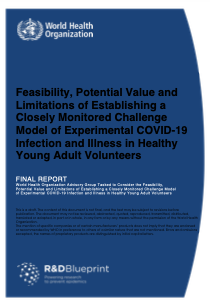Feasibility, potential value and limitations of establishing a closely monitored challenge model of experimental COVID-19 infection and illness in healthy young adult volunteers

Overview
Recognizing the helpful role that experimental challenge studies in healthy adult volunteers have played in the development of certain vaccines, some have advocated a role for such studies with virulent SARS-CoV-2.
However, several factors collectively warrant that special caution must be taken in working with SARS-Cov-2, including:
o the severity of COVID-19 disease, as evidenced by its high case fatality risk in certain sub- populations (elderly, diabetics, hosts with pre-existing pulmonary and cardiac disease);
o severe disease requiring ventilator support and deaths (albeit uncommon) also occurs in young adults, although risk factors for these outcomes in this age group remain uncharacterized; increasing recognition of severe thromboembolic events in young adults;
o the high transmissibility of SARS-CoV-2 from person-to-person directly by respiratory droplets and at further distances by airborne droplet nuclei;
o the virus’ ability to remain viable on some fomites for hours; with each passing month, new acute presentations and forms of illness that SARS-CoV-2 infection can elicit have been described;
o finally, as of early June 2020, a reliable “rescue treatment” has not yet been identified that can predictably arrest the progression of COVID-19 illness from a mild/moderate illness to serious, potentially life-threatening, illness.
Understandably, among experienced challenge model investigators the topic of undertaking challenge studies with fully virulent SARS-CoV-2 has generated discussion about whether the conditions can be assured to perform challenge studies safely and what the priority goals should be for such studies.
